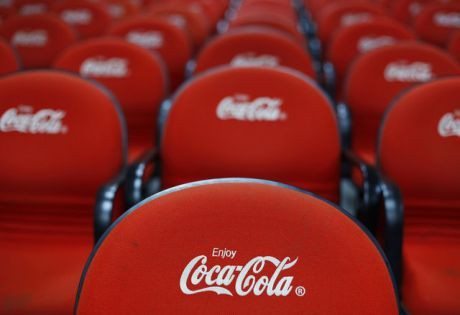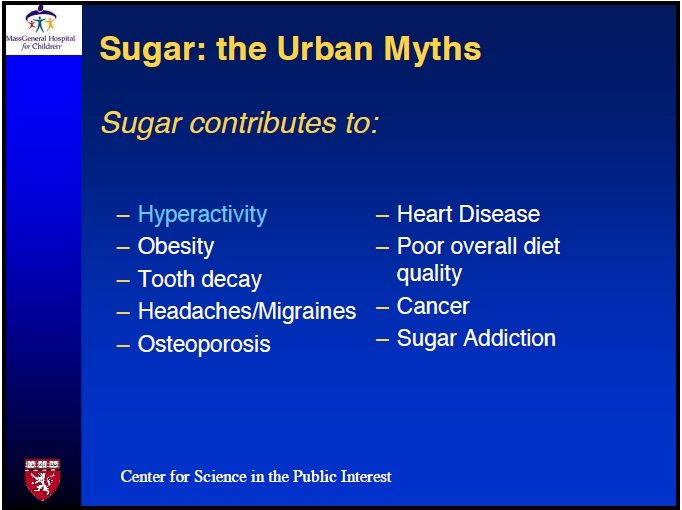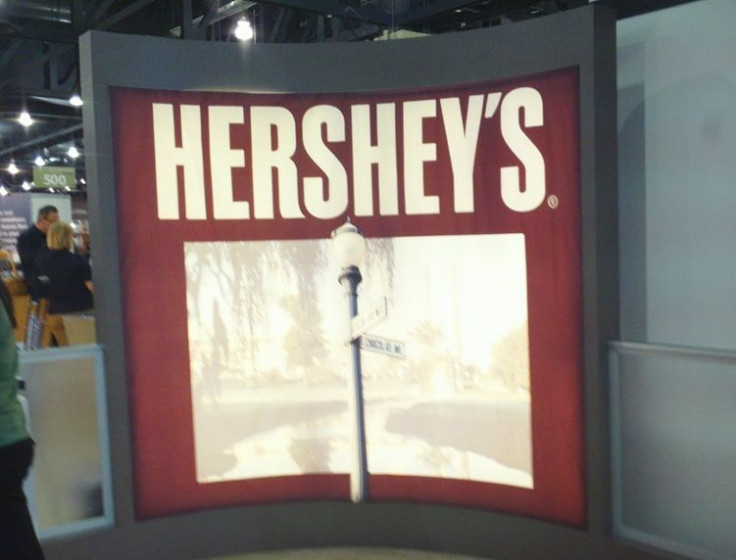Nutrition Industry Sold Out To Coca-Cola, PepsiCo, Kellogg, Hershey And Other Junk Food Giants, Registered Dietitians Say

Forget everything you’ve heard about sugar. Maybe it’s just getting a bad rap. Obesity? Tooth loss? Don’t blame the sweet white stuff. Despite evidence to the contrary, sugar hasn’t contributed one iota to the nation’s health problems. Right?
That’s what the Coca-Cola Company (NYSE:KO) seems to want America’s nutrition experts to believe. Through its Beverage Institute for Health and Wellness, the multinational beverage giant sponsors a slew of accredited continuing education programs for registered dietitians, or RDs. Coke-sponsored programs cover such topics as managing diabetes, promoting healthy bones and dietary recommendations for children, all aimed at RDs seeking to fulfill their annual educational requirements. In other words, a company whose signature product is a major contributor to the obesity epidemic -- as Harvard School of Public Health noted -- is involved in the credentialing of the professionals who are tasked with educating us about the epidemic.
Outraged yet? Keep reading. Coca-Cola isn’t the only corporate giant influencing the conversation on healthful eating habits. The Academy of Nutrition and Dietetics, the country’s largest trade association for nutrition professionals, has for years been accepting sponsorships from what many describe as “Big Junk Food”: PepsiCo Inc. (NYSE:PEP), Hershey Co. (NYSE:HSY), General Mills Inc. (NYSE:GIS) and Kellogg Co. (NYSE:K) are just some of the companies listed as partners or sponsors in its 2012 annual report. Sponsorships -- offered at various levels -- help support the Academy’s various events and activities, with top-level sponsors (“partners”) given the opportunity to present educational sessions to Academy members.
At the very least, such arrangements present a kind of obvious irony, at least to anyone with a digestive system. The Academy has long maintained that it’s important to “be at the same table with food companies,” and it insists that its sponsorship program in no way affects its policy positions. But critics say corporate influence is both tainting the Academy’s reputation and affecting its positions.
“The level of cooptation is really disturbing,” said Michele Simon, an author and public health lawyer who in January published an expansive report criticizing the Academy’s sponsorship arrangements. “This is a profession whose job it is to tell people how to eat right.”
Simon is among a growing number of health-conscious dissenters calling attention to the strange bedfellows of nutrition advocates and the food industry. She sees a major conflict of interest, whereby the nation’s nutrition industry has been hijacked by the very companies whose products most contribute to our obesity and health problems.
And her report hasn't gone unnoticed by registered dietitians. Following its publication, Andy Bellatti, an RD based in Henderson, Nev., launched a petition on Change.org, calling on the Academy to cut ties with corporate food giants. The petition has been signed by more than 20,000 people and counting. Bellatti estimated that about 1,000 of those signatories are dietitians. Others, he said, are parents, consumers and just everyday people flabbergasted by the infiltration.
“People everywhere are just really concerned about this,” Bellatti said in a phone interview.
A spokesman for the Academy downplayed the magnitude of the concern, in particular the dissent from Academy membership. In an email to IBTimes, the spokesman said that given the size of the organization -- 75,000 members -- it’s only natural that some members will disagree with some of its initiatives and activities.
“[W]e encourage and support a healthy and productive dialogue among and with our members,” the spokesman said. “But we stand behind our messages and positions and their independence from corporate influence.”
Bellatti said that stance is indicative of the Academy’s “tone deafness” on the issue. In attempts to spark a dialogue with Academy leaders, he and his like-minded cohorts have grown increasingly frustrated by what they see as the habitual marginalization of their concerns.
“They’re treating us like we’re a fringe group,” he said. “That’s the absolute worst part about it.”
Fringe group or no, Bellatti believes he’s drawn the Academy’s attention. His newly formed organization, Dietitians for Professional Integrity, has already attracted more than 4,800 Facebook fans. The group advocates for greater financial transparency within the Academy. Bellatti said the Academy has even gone so far as to purchase the URL IntegrityRDs.org to prevent his group from obtaining it first.
“That’s our Twitter handle,” he said. “They bought it before I had a chance to.”
The Academy acknowledged that it owns the URL (which isn't currently attached to any website), but it declined to say whether the address was purposely snatched from Bellatti. “The Academy owns a number of URLs related to our members’ professional credentials,” the Academy spokesman said.
Majoring In Junk Food?
Despite its proletariat-sounding name, the Academy is more than a simple trade group. It's involved, either directly or indirectly, in almost every stage of becoming and remaining a registered dietitian. Both the accreditation council for dieticians’ educational programs and the agency that oversees RD credentialing operate under the Academy’s umbrella, though the organization says they operate independently of the Academy’s governing bodies.
Once RDs are registered, they must complete a certain number of continuing educational requirements each year to maintain their registration. That’s where food companies come in. For instance, on Today’s Dietician, RDs can take an accredited course on vegetarianism courtesy of Bush’s Baked Beans or a webinar on fiber sponsored by Kellogg. Not all nutrition courses are sponsored by food companies, but those that are tend to be free for RDs, as opposed to non-sponsored courses that can range anywhere from $15 to $50. Among the major food companies, it’s Coca-Cola that seems most interested in molding the minds of RDs. Its Beverage Institute features more than two-dozen free nutrition seminars, all accredited and officially sanctioned by the Academy’s Commission on Dietetic Registration.
“They’ve completely infiltrated the education system,” Simon said. “One seminar is more absurd than the next -- talking about how artificial sweeteners are just fine. Any potential problems an RD might have heard about out there in the scientific world, Coca-Cola is right there to tell them, ‘No worries. Everything’s fine.’”
Ronald E. Kleinman, a pediatrics professor at Harvard Medical School, discussed research on artificial sweeteners in 2010 when he presented a Coke-sponsored seminar on children’s dietary recommendations. In a phone interview, he took issue with the idea that the seminar reflected some kind of agenda for the beverage giant. Rather, he said he simply presented available research on fluoride, sugar, artificial coloring and artificial sweeteners, mostly in regard to their effects on children’s behavior and hyperactivity.
“I didn’t cherrypick studies that support my position,” he said. “I presented a set of 15 to 20 studies for each of these. I think that anybody looking that whole body of research over would come to the same conclusions.”
Yet, it’s easy to see how onlookers would see a different picture. Slides that accompanied Kleinman’s seminar seem framed as an endorsement of sugar and artificial sweeteners, even if they don’t explicitly say so. At best, the slide presentation is misleading, purporting to confront various “urban myths” and then lumping “obesity” and “tooth decay” in with the bullet points. Is Kleinman suggesting that sugar doesn’t contribute to obesity and tooth decay? He says, emphatically, no way.
“Nowhere in this presentation do I say that sugar has no role in these areas,” he said. “That would absolutely be ridiculous.”
Kleinman also stressed for the record that he is dead-set against corporate speakers’ bureaus. He said that he agreed to do the seminar (pro bono) only after he was assured that Coke’s beverage institute would have “zero influence.” In fact, he was surprised to learn that his three-year-old presentation is still being offered to RDs on the Coca-Cola Beverage Institute’s website.
“My understanding was that it was going to be a one-off presentation available for continuing education,” he said. “I didn’t know it was for anything longer than that.”

Keeping Up Appearances
The notion of zero corporate influence is one to which the Academy says it has long held. (“The Academy’s messages and positions are science-based and are in no way influenced by our sponsors,” the spokesman told IBTimes.) But critics say evidence of that influence isn't hard to find. In her report, Simon pointed out that the Academy is routinely unwilling to support nutrition policies that might anger its sponsors -- such as mandatory labeling of genetically modified organisms, or GMO, products, which PepsiCo and Kellogg have fought tooth and nail. In a lengthy rebuttal on its website, the Academy shot back at Simon’s claims:
“The fact that the Academy has not issued a position on an issue is not evidence of Academy support for -- or opposition to -- that issue.”
None of this, of course, addresses the question of perception. Many dieticians say it's simply inappropriate for the Academy to take money from companies that trade in empty calories. Walk into the Academy’s annual Food & Nutrition Conference & Expo -- billed as the world’s largest meeting of nutrition experts -- and you’ll see booths featuring brand-name sodas, potato chips, even chocolate. Simon said that while many RDs are “embarrassed” by the displays, many more have been trained to accept them as the status quo.
“Part of it is that it’s normalized,” Simon said. “Obviously a lot of the RDs who attend the annual meeting know what’s going on. They see the obvious, but then they don’t even see that there is anything wrong with it.”
The Academy doesn’t share specific figures detailing how much money it receives from food companies, but based on public documents, it’s no small number. According to the Statement of Activities on its annual report, the organization took in just over $2 million from sponsorships in 2012, just over 6 percent of its total revenue. Indeed, weaning the Academy off junk-food money may prove just as challenging as weaning Americans off junk food.

Leadership Challenges
Despite raging disagreements between RDs, the Academy and the food industry, few would argue that nutrition information is in a holding pattern. It’s a constantly evolving field, a frustrating and perplexing arena, where one research study after another seems to contradict everything we thought we knew.
Bellatti, who plans to present his petition at the Academy’s annual expo in October, said many of the Academy’s biggest problems stem from inflexible leadership, whose ideas about nutrition are increasingly out of date. Simon, too, believes the winds of change rest on the shoulders of younger RDs who are rejecting the Academy’s powers that be.
“I do think they’re increasingly going to find themselves in the dark ages,” she said. “My impression is that there’s an old guard of leadership that is hanging on tight to the way things have been done, but there are younger RDs coming up who don’t accept the status quo and see this for what it is.”
Asked about Simon’s research, the Academy was quick to dismiss her credibility, pointing out that Simon is neither a RD nor a nutrition professional. “Her opinion will not influence the Academy’s decisions,” the spokesman said.
And yet, according to a statement from none other than Coca-Cola, being outside the nutrition industry shouldn’t preclude one from getting involved in the discussion. In response to a question about the appropriateness of its sponsorship of the Academy, the beverage giant said that it supports the Academy’s science-based approach to nutrition, but added that no one group can solve the obesity epidemic alone. “We all have a role to play in helping find solutions,” the Coke spokesman said.
It’s an idea with a certain logic, even if its practical application hasn’t done all that much for our waistlines.
“We’ve been hearing that line for a long time,” Simon added. “Look, if that were a successful method of engagement, we wouldn’t be in the mess that we’re in now.”
Correction: An earlier version of this story said that the Academy’s sponsorship program from June 1, 2011 -- May 31, 2012, made up more than 20 percent of its total revenue of $33,964,432. The sponsorship program during that period made up $2,079,751, just over 6 percent of its revenue.
Got a news tip? Send me an email. Follow me on Twitter: @christopherzara
© Copyright IBTimes 2024. All rights reserved.












